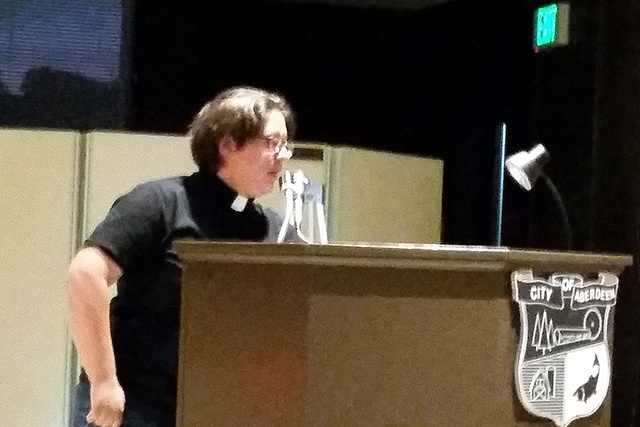James Horack and William Hougham told Aberdeen City Council members Wednesday that despite the perception of many people in the community, not everyone within the homeless population is a substance user or dealing with mental health challenges.
One man living along the Chehalis River is suffering from cancer. Others there they said, were abused spouses or simply people who ran out of options.
“Don’t shun us,” said Horack, who’s homeless, suffering from PTSD and been in Aberdeen for about a year. “I want to work. Just because I’m homeless or in a shelter doesn’t mean I’m not hireable.”
Though he is grateful for assistance provided by local churches and other groups, living in a shelter wasn’t right for him, he told the council members.
Not having a permanent residence makes it even harder to obtain steady employment as basic daily activities are a struggle to complete because such tasks are so time consuming.
“Where can I get water? What can I eat?” he asked.
Horack explained he receives food stamps but has nowhere to cook. He asked if there was a way to subsidize homeless workers so employers would have to pay only half of the person’s wages.
Hougham, agreed that simple tasks take massive effort to complete when one is without a place to live. He is frustrated by inaction from the city and would like to see water and restrooms available to this population.
“You just keep discussing it but for us, every day, it’s an issue,” Hougham said.
Mayor Erik Larson explained the city couldn’t use public funds to provide water and portable toilets to people camping on private land.
Council member Kathi Hoder met last week with Rognlin’s Inc. and other city officials to talk about the group of homeless people on Rognlin’s recently acquired Chehalis River front property. The business is now cleaning up the site for future use. She said there are so many things local government can’t do, and that not only the homeless people, but local business owners and other community members, are affected by the situation too.
“I don’t feel like I’m leading very well,” she said sadly. “There are so many people that are hurting. We need a happy medium. We’re looking for answers.”
Hougham urged that funding be found to help the homeless population because it would save the community money in the long run. Losses from shoplifting done by some homeless people, whom he called “boosters,” are substantial. Only a fraction of the amount lost because of shoplifters would assist local homeless people significantly and, perhaps, break the cycle, he told the council members.
“The people who are most affected are telling us what they need. We ought to be listening to them,” said Rev. Sarah Monroe of Chaplains on the Harbor in Westport, who spends a great deal of time with homeless people and said she knows many of them by name.
Monroe made a point after the meeting about how the problem of homelessness has become something many in society simply seem to tolerate as well as have little information about why people end up without a place to live. She heard one of the speakers tell the council 150 people were living by the river and used the number to make a point about the high level of societal indifference.
“If 150 citizens who are housed show up at a council meeting and say they don’t have sanitation or water we’d jump all over that,” she said. “Homelessness has become something we expect. We’re talking about massive amounts of need here. It’s really frustrating when people’s lives are in the balance.”
Larson talked about how Olympia has a housing program that allows some people returning to the work force to pay 30 percent of their income in rent until they make enough money to pay 30 percent of the actual rental cost of a housing unit. But Aberdeen doesn’t have a facility like that and creating housing here for the homeless will take years, he explained.
He also hinted some type of housing or shelter is in the works that could be ready within the next year or two. Other than saying it was being done by an entity outside of government, he wouldn’t say who the party is or disclose other details about the plan.
“If we don’t start now it’ll kick the can down the road five more years,” he said. “We need to commit and do it.”
Subsequent inquiries to Larson about such a plan were directed to the Coastal Community Action Program. Craig Dublanko, CCAP’s executive director, weighed in on the issue.
“CCAP is exploring multiple options to help solve the problem,” Dublanko said. “We’re working very hard on it. We’re optimistic.”
And while there are options in the city for single men besides living on the streets or camping by the river, a homeless teen or father with children has a much more difficult time finding shelter, Larson said.
There is also not nearly enough decent housing for people in Aberdeen who don’t make much money and that also needs to be addressed, Larson said Wednesday night.
“Substandard housing masking as an answer isn’t healthy,” Larson stressed.
He also intends to discuss the homeless issue with state health officials and elected officeholders in an effort to “make our problems known to them.”



